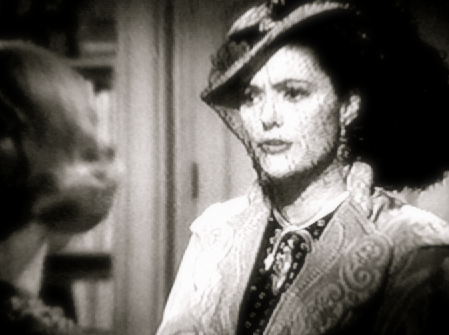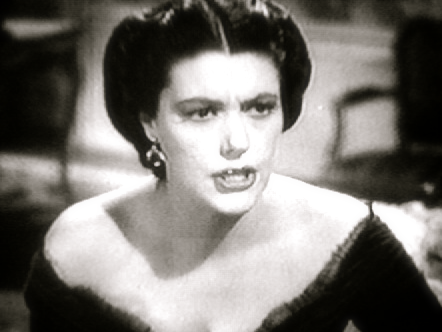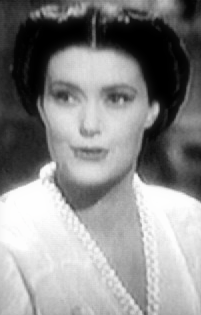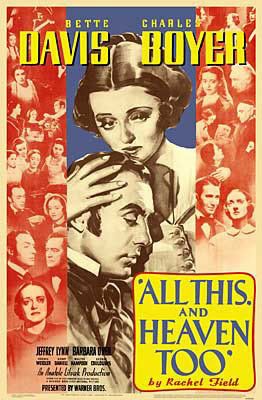 I was going to try to introduce this week's profile with a whole jag on how video not only killed the radio star, but also the big, blowsy, bodacious "women's picture"...how daytime and nighttime soaps, as well as the tv mini-series and Lifetime movie, have taken all the grand romances of innocence, infidelity, and crazy rich bitches (the sort of stories that made Bette Davis a star) off the silver screen and permanently confined them to the small screen. I was gonna go on about all that but whatever. Let's just get to this week's cinematic concoction which brings us the kind of unhinged character performance you'd like to never see on the big screen today (unless Fiona Shaw happens to be involved), but which was given in 1940 with glamorous ease by...
I was going to try to introduce this week's profile with a whole jag on how video not only killed the radio star, but also the big, blowsy, bodacious "women's picture"...how daytime and nighttime soaps, as well as the tv mini-series and Lifetime movie, have taken all the grand romances of innocence, infidelity, and crazy rich bitches (the sort of stories that made Bette Davis a star) off the silver screen and permanently confined them to the small screen. I was gonna go on about all that but whatever. Let's just get to this week's cinematic concoction which brings us the kind of unhinged character performance you'd like to never see on the big screen today (unless Fiona Shaw happens to be involved), but which was given in 1940 with glamorous ease by...approximately 20 minutes and 43 seconds
17 scenes
roughly 15% of film's total running time
17 scenes
roughly 15% of film's total running time
Barbara O'Neil plays the Duchesse de Praslin, the imperious lady whose children, home and husband fall under the spell of a mousy governess (Bette Davis doing her basic "humility is nobility" bit, characteristically electric and moving at an incisive clip).
The Duchesse's marriage (to the mildly squicky Charles Boyer) is in trouble, and the incredibly, righteously self-absorbed Duchesse just cannot be bothered with attending to banal details -- like her children -- as she seeks to regain her husband's attention and good grace.
 Of course, the children and the Duke are soon smitten with the new governess, and the Duchesse discovers in Davis a new target for her paranoic rages, a new core conspirator in the many plots against her beleaguered happiness.
Of course, the children and the Duke are soon smitten with the new governess, and the Duchesse discovers in Davis a new target for her paranoic rages, a new core conspirator in the many plots against her beleaguered happiness. O'Neil's performance in the role of the Duchesse is a curious one. O'Neil seems to understand that the Duchesse doesn't believe her own hype, that beneath the Duchesse's bellowing bluster and bombastic outfits hides a genuinely terrified creature. As best as I can tell, O'Neil's Duchesses lives terrorized by a previous circumstance, in which she did something to destroy her husband's affection (corrupt his patrimonial legacy perhaps?) and now she has no idea how to regain his trust or his love. So configured, the actress's mugging fury, eye-bugging shock, and keening sadness then work, in O'Neil performance, as a kind of perfect storm concealing the Duchesse's abject desperation.
O'Neil's performance in the role of the Duchesse is a curious one. O'Neil seems to understand that the Duchesse doesn't believe her own hype, that beneath the Duchesse's bellowing bluster and bombastic outfits hides a genuinely terrified creature. As best as I can tell, O'Neil's Duchesses lives terrorized by a previous circumstance, in which she did something to destroy her husband's affection (corrupt his patrimonial legacy perhaps?) and now she has no idea how to regain his trust or his love. So configured, the actress's mugging fury, eye-bugging shock, and keening sadness then work, in O'Neil performance, as a kind of perfect storm concealing the Duchesse's abject desperation.O'Neil seems, then, to have lain an appropriately deep groundwork. Further, the actress's resonant vocality serves the Duchesse, both in allowing her shrieks to penetrate walls and to aurally locate O'Neil as a resonant counterpoint to Davis's tinkling, staccato reediness. With all of this in place, then, why doesn't O'Neil's performance actually work?
 StinkyLulu's inclined to think that, with all her vividness (O'Neil catapults into full-on, operatic gorgon mode any time she's on screen), O'Neil's Duchesse is almost too "in the moment." O'Neil's Duchesse is seen to be the kind of character who lashes out, arbitrarily, whenever her plans go awry, her casually cruel impetuousness leaving wreckage in its roiling wake. Yet, it seems to me that the character's actually on her way to crazy town, experiencing a kind of paranoic psychosis, causing her family to alternately fear her and fear for her. Indeed, Duchesse seems an early cinematic entry into the "I Will Not Be Ignored" tradition of female cinemonsters and, perhaps as a result, StinkyLulu craved for O'Neil to tweak the Duchesse's craziness away from rich bitchery and toward the insanity of erotic obsession.
StinkyLulu's inclined to think that, with all her vividness (O'Neil catapults into full-on, operatic gorgon mode any time she's on screen), O'Neil's Duchesse is almost too "in the moment." O'Neil's Duchesse is seen to be the kind of character who lashes out, arbitrarily, whenever her plans go awry, her casually cruel impetuousness leaving wreckage in its roiling wake. Yet, it seems to me that the character's actually on her way to crazy town, experiencing a kind of paranoic psychosis, causing her family to alternately fear her and fear for her. Indeed, Duchesse seems an early cinematic entry into the "I Will Not Be Ignored" tradition of female cinemonsters and, perhaps as a result, StinkyLulu craved for O'Neil to tweak the Duchesse's craziness away from rich bitchery and toward the insanity of erotic obsession.Nonetheless, O'Neil's enormous presence in the film provides more than its share of giddy thrills. Her brilliantly theatrical facial tics animate, say, "the letter" scene (above - click pic to enlarge) with a cunning that is at once dastardly, despicable and delicious.
 But even though Barbara O'Neil gives this deathly dull film its only true kicks, I yet craved for more "truth" within this melodramatic bauble of a performance.
But even though Barbara O'Neil gives this deathly dull film its only true kicks, I yet craved for more "truth" within this melodramatic bauble of a performance.









No comments:
Post a Comment